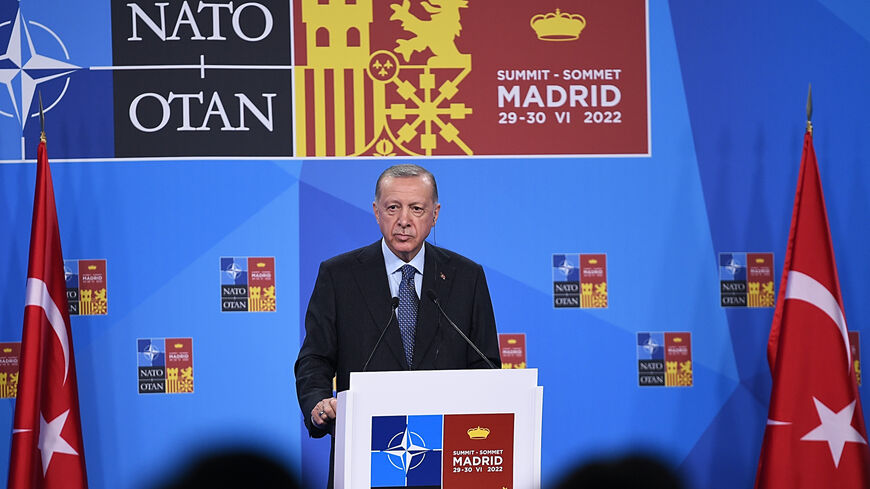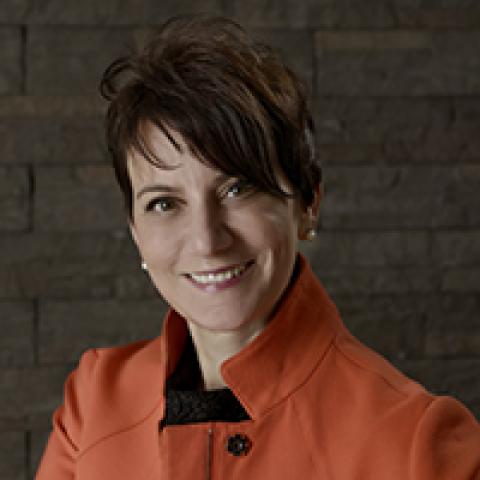IZMIR, Turkey — Turkish President Recep Tayyip Erdogan will meet Swedish Prime Minister Ulf Kristersson Monday in Vilnius, Lithuania — before the alliance’s summit on July 11-12 — in a last-ditch effort to overcome Turkey’s objections to Sweden’s bid to join NATO, the NATO secretary-general said Thursday after a tripartite meeting at the security alliance's headquarters in Brussels.
“It is possible to have a positive decision in the summit,” NATO Secretary-General Jens Stoltenberg said after the meeting of the foreign ministers of Turkey, Sweden and Finland in the NATO headquarters under a tripartite mechanism established last year.
Stoltenberg, sounding determinedly upbeat, said the sides reaffirmed that Sweden’s membership was “within reach” and voiced hope for a favorable decision from Turkey. Ankara has been resisting pressures to give the nod to Sweden as NATO’s 32nd member, saying that Stockholm has been lenient toward groups that Turkey deems terrorists and a threat to its national security. NATO needs approval from all members to expand.
“What is possible and what we are trying to achieve is to get a positive decision in the summit where Turkey makes it clear that it is ready to ratify [Sweden’s bid],” Stoltenberg said, implying that, given the tight schedule, the ratification would have to come later even if Turkey agreed to lift its objections Monday.
Erdogan and Kristersson will come together in Vilnius ahead of the summit. The scenario looks very much like last year’s Madrid summit, where Erdogan agreed at the 11th hour to start the accession process of Sweden and Finland after the three countries made a deal on cracking down on anti-Turkish groups, extraditing or deporting the people Turkey considers terrorists, and lifting arms embargoes to Turkey. Turkey ratified Finland’s bid earlier this year but has kept Sweden waiting.
The challenge, Stoltenberg said, was to “bridge the gap between what Sweden has done and the understanding Turkey has relating to what Sweden has done.” Thursday’s meeting, where the intelligence chiefs of the two countries were present, was able to take up very specific issues, he said. The secretary-general also stressed that after Sweden's membership, anti-terrorism cooperation between Turkey and Sweden would continue both bilaterally and within the NATO context.
Despite Stoltenberg’s upbeat tone, the statement from Turkey and Sweden demonstrated that the gap was considerable, at least as far as their negotiation positions were concerned ahead of their leader’s meeting.
“We need to see that the legislative change is reflected on the ground,” said Turkish Foreign Minister Hakan Fidan, who chaired the delegation that consisted of his deputy Ambassador Burak Akcapar, intelligence chief Ibrahim Kalin, and the president’s foreign policy and national security adviser Cagatay Kilic. “Sweden could not prevent provocations, which affects Ankara's stance,” he said, referring to the recent desecration of the Quran in Stockholm. Fidan added that Turkey wanted to ensure that Sweden would be a reliable partner in NATO.
Sweden’s Foreign Minister Tobias Billstrom told journalists that Turkey had actually agreed that they had made some progress. “I don’t think there is anything more that can be done … we believe we have fulfilled our obligations … to Turkey,” he told journalists, adding that Stockholm expected a positive outcome next week.
Mere hours before the tripartite meeting, a Turkish man was found guilty in Sweden of attempted aggravated extortion, weapons possession and attempted terrorist financing, saying he was acting on behalf of the PKK. The Stockholm District Court sentenced Yahya Gungor to 4½ years in prison, after which he would be expelled from Sweden and banned from returning. It was the first time that a Swedish court sentenced someone for terrorist financing of the party, Judge Mans Wigen said.
“This news comes on the very day of the high-level meeting in Brussels. It will allow the Swedish foreign minister to tell his Turkish counterpart that authorities are taking PKK financing seriously. It is precisely the kind of “concrete results” Turkey has demanded,” tweeted Paul Levin, director of Stockholm University Institute for Turkish Studies.
On Monday, all eyes will be on Turkey’s stubborn president. Despite heaping pressures from allies, Erdogan has maintained his spoiler role on Sweden’s accession as he repetitively rebuked Stockholm for its failure to crack down on Kurdish militant groups. In a phone call with Dutch Prime Minister Mark Rutte late Wednesday, he said that though Sweden had moved in the right direction with its recent anti-terror legislation amendments, demonstrations by the PKK and its two affiliates in Syria had negated those steps.
President @RTErdogan spoke by phone with Prime Minister Mark Rutte of the Netherlands.
— Presidency of the Republic of Türkiye (@trpresidency) July 5, 2023
The call addressed bilateral relations, Sweden’s NATO accession process, the provocative acts against the Holy Quran in Europe as well as regional and global issues.
Noting that the 100th…
Sweden’s icy path to NATO
Sweden, along with Finland, waved aside its long-rooted nonalignment policy to apply to the military alliance after the Russian invasion of Ukraine in February 2022. The two Nordic states applied to NATO together and jointly negotiated a three-way agreement paving the road for the alliance’s expansion.
Last March, Ankara deemed that Finland, which shares an 832-mile (1,340-kilometer) border with Russia, had done enough to fulfill its commitments under the protocol and ratified its accession with a unanimous vote in the Turkish parliament, leaving Sweden out in the cold.
Though Hungary is also holding up approval of Sweden’s candidacy, many NATO officials expect that Hungary will follow suit once Ankara lifts its objections. So does Kristersson, who said last week that Hungary had given assurances that it would not hold things up. “Twice, I have spoken to Prime Minister (Viktor) Orban,” Kristersson told reporters. “Both times he has confirmed that Hungary will not delay.”
Many of Turkey’s Western allies, some of whom hoped that Erdogan would relent on Sweden after elections in Turkey, have called the incumbent president personally to underline the importance of Sweden’s accession to the military alliance, hoping he’d be sufficiently swayed by flattery (such as French President Emmanuel Macron’s congratulatory tweet in Turkish) or political carrots. “I spoke to Erdogan. I congratulated Erdogan,” US President Joe Biden told reporters after the Turkish leaders’ political victory in May. “He still wants to work on something on the F-16s. I told him we wanted a deal with Sweden, so let’s get that done.”
Ankara says there is no link between the two, claiming that Turkey’s acquisition of new F-16 warplanes and upgrade kits to modernize Turkey’s fleet matters for the alliance’s overall strength and is not linked to any country’s accession.
On Wednesday, US Secretary of State Antony Blinken called Fidan to stress “the importance of NATO unity in such a critical time.” Blinken “encouraged Turkey’s support for Sweden to join the NATO alliance now,” the State Department said in a statement.
I had a good conversation with Turkish Foreign Minister@HakanFidan about longstanding U.S.-Türkiye bilateral defense ties and next week’s NATO Summit. Now is the time for Sweden to formally join the Alliance.
— Secretary Antony Blinken (@SecBlinken) July 6, 2023
Blinken’s call to Fidan came as Biden welcomed Kristersson to the White House on Wednesday in a show of solidarity ahead of the summit. Biden said that he was “anxiously looking forward” to Sweden’s acceptance into NATO.
But Fatih Ceylan, Turkey’s former ambassador to NATO, said there may still be a window of opportunity. "I think everyone will have things in their pockets and in their minds when they go to Vilnius. … Maybe a solution will be found there,” Ceylan said.








